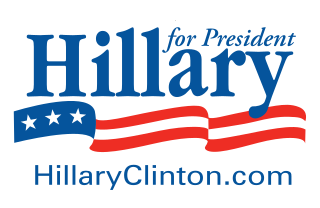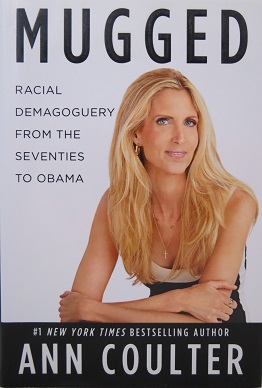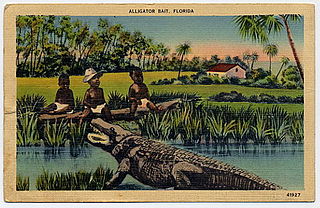Related Research Articles

Rush Hudson Limbaugh III was an American conservative political commentator who was the host of The Rush Limbaugh Show, which first aired in 1984 and was nationally syndicated on AM and FM radio stations from 1988 until his death in 2021.
The Magical Negro is a trope in American cinema, television, and literature. In the cinema of the United States, the Magical Negro is a supporting stock character who comes to the aid of the protagonists in a film. Magical Negro characters, often possessing special insight or mystical powers, have long been a tradition in American fiction. The old-fashioned word "Negro" is used to imply that a "magical black character" who devotes himself to selflessly helping whites is a throwback to racist stereotypes such as the "Sambo" or "noble savage".
Honky is a racial slur used to refer to white people, predominantly heard in the United States.
Miss Ann is an expression used inside the African-American community to refer to a European-American woman who is arrogant and condescending in her attitude.

The Rush Limbaugh Show was an American conservative talk radio show hosted by Rush Limbaugh. Since its nationally syndicated premiere in 1988, The Rush Limbaugh Show became the highest-rated talk radio show in the United States. At its peak, the show aired on over 650 radio stations nationwide.
In politics, a dog whistle is the use of coded or suggestive language in political messaging to garner support from a particular group without provoking opposition. The concept is named after ultrasonic dog whistles, which are audible to dogs but not humans. Dog whistles use language that appears normal to the majority but communicates specific things to intended audiences. They are generally used to convey messages on issues likely to provoke controversy without attracting negative attention.
Hip is a slang for fashionably current and in the know. To be hip is to have "an attitude, a stance" in opposition to the "unfree world", or to what is square or prude. Being hip is also about being informed about the latest ideas, styles, and developments.

The 2008 presidential campaign of Hillary Rodham Clinton, then junior United States senator from New York, was announced on her website on January 20, 2007. Hillary Clinton was previously the First Lady of the United States and First Lady of Arkansas prior to her election as U.S. Senator from New York. She is also the wife of former President Bill Clinton. Clinton was the source of much media speculation since having expressed interest in being a candidate in the 2008 presidential election since at least October 2002.

Cracker, sometimes cracka or white cracker, is a racial epithet directed towards white people, used especially with regard to poor rural whites in the Southern United States. Although commonly a pejorative, it is also used in a neutral context, particularly in reference to a native of Florida or Georgia.

Sarah Palin, while serving as Governor of Alaska, was nominated as the first female candidate of the Republican Party for Vice President of the United States. Following the nomination, her public image came under close media scrutiny, particularly regarding her religious perspective on public life, her socially conservative views, and a perceived lack of experience. Palin's experience in foreign and domestic politics came under criticism among conservatives as well as liberals following her nomination. A poll taken by Rasmussen Reports just after the Republican National Convention in the first week of September 2008 found that Palin was more popular than either Barack Obama or John McCain; however, this perception later reversed. At the same time, Palin became more popular among Republicans than McCain. A February 2010 ABC News/Washington Post poll showed 71% of Americans felt Palin lacked the qualifications necessary to be President of the United States.

Boyce D. Watkins is an American author, political analyst, social influencer and ex-academic. In addition to publishing scholarly articles on finance and investing, Watkins is an advocate for education, economic empowerment, and social justice, and has made regular appearances in various national media outlets, including CNN, Good Morning America, MSNBC, Fox News, BET, NPR, Essence, USA Today, Today, ESPN, The Tom Joyner Morning Show, and CBS Sports. He was also a frequent guest on The Wendy Williams Experience radio program, and remains a frequent contributor to the Grio.
Casey Kauffman is an American journalist who works for Al Jazeera English, the first English-language news channel headquartered in the Middle East.

"Death panel" is a political term that originated during the 2009 debate about federal health care legislation to cover the uninsured in the United States. Sarah Palin, former governor of Alaska and 2008 Republican vice presidential candidate, coined the term when she charged that proposed legislation would create a "death panel" of bureaucrats who would carry out triage, i.e. decide whether Americans—such as her elderly parents, or children with Down syndrome—were "worthy of medical care". Palin's claim has been referred to as the "death panel myth", as nothing in any proposed legislation would have led to individuals being judged to see if they were worthy of health care.

The 2012 Benghazi attack was a coordinated attack against two United States government facilities in Benghazi, Libya, by members of the Islamic militant group Ansar al-Sharia. On September 11, 2012, at 9:40 p.m. local time, members of Ansar al-Sharia attacked the American diplomatic compound in Benghazi resulting in the deaths of both United States Ambassador to Libya J. Christopher Stevens and U.S. Foreign Service Information Management Officer Sean Smith. At around 4:00 a.m. on September 12, the group launched a mortar attack against a CIA annex approximately one mile (1.6 km) away, killing two CIA contractors Tyrone S. Woods and Glen Doherty and wounding ten others. Initial analysis by the CIA, repeated by top government officials, indicated that the attack spontaneously arose from a protest. Subsequent investigations showed that the attack was premeditated—although rioters and looters not originally part of the group may have joined in after the attacks began.

Mugged: Racial Demagoguery from the Seventies to Obama is a 2012 book by Ann Coulter, in which the author discusses race and liberalism.
Daryl Cumber Dance is an American academic best known for her work on black folklore.
Banana, coconut, and Twinkie are pejorative terms for Asian Americans who are perceived to have been assimilated and acculturated into mainstream American culture. In Australia, South Africa, and the United Kingdom, coconut is similarly used against people of color to imply a betrayal of their Aboriginal or other non-white ethnic identity. The terms derive from a perception that a person is "yellow [or brown] on the outside, white on the inside", or is "acting white".

"Owning the libs" is a political strategy used by some conservatives in the United States that focuses on offending the American liberals in order to appear dominant. Users of the strategy emphasize and expand upon culture war issues intended to be divisive to provoke a reaction in others, much akin to internet trolling.

Depicting African-American children as alligator bait was a common trope in American popular culture in the 19th and 20th centuries. The motif was present in a wide array of media, including newspaper reports, songs, sheet music, and visual art. There is an urban legend claiming that black children or infants were in fact used as bait to lure alligators, although there is no meaningful evidence that children of any race were ever used for this purpose. In American slang, alligator bait is a racial slur for African-Americans.
Harriette Dubose Kershaw Leiding, known socially as Mrs. H. G. Leiding, was an American writer, clubwoman, and gallery director, based in Charleston, South Carolina. She wrote several local histories, including Street cries of an old southern city; with music and illustrations (1910), Historic Houses of South Carolina (1921), and Charleston, Historic and Romantic (1931). Her photographs are in the Charleston Museum.
References
- ↑ Linn, Michael D. (1975). "Black Rhetorical Patterns and the Teaching of Composition". College Composition and Communication. 26 (2): 149–153. doi:10.2307/357106. JSTOR 357106.
- ↑ Foster, Herbert L. (1990). Ribbin', Jivin', and Playin' the Dozens: The Persistent Dilemma in Our Schools. Herbert L. Foster Associates, Incorporated. ISBN 978-0-9624847-0-4.
- ↑ Reeve, Elspeth (October 24, 2012). "Was It Racist for Palin to Accuse Obama of 'Shuck and Jive'?". The Atlantic . Retrieved October 29, 2024.
- ↑ Kipfer, Barbara Ann; Chapman, Robert L. (October 19, 2010). American Slang (4th ed.). Harper Collins. p. 438. ISBN 978-0-06-204324-5.
- ↑ Major, Clarence (1994). Juba to Jive: A Dictionary of African-American Slang. Penguin Books. ISBN 978-0-14-051306-6.
- 1 2 Martin, Roland (January 11, 2008). "Martin: 'Shucking and jiving' and the campaign trail". CNN. Archived from the original on January 16, 2008. Retrieved October 29, 2024.
- ↑ Palin, Sarah (October 24, 2012). "Palin: Obama's Shuck and Jive Ends with Benghazi Lies". Fox Nation. Archived from the original on February 1, 2014. Retrieved October 29, 2024.
- ↑ Condon, Stephanie (October 25, 2012). "Palin says her critique of Obama wasn't racist". CBS News. Retrieved October 29, 2024.
- ↑ Gold, Hadas (September 9, 2013). "Joan Walsh: Limbaugh a 'racist troll'". Politico .
'Bush had Shock and Awe? We're looking at shuck and jive here. That's what I'm gonna name this. The Obama operation in Syria, Operation Shuck and Jive, because that's what this is.'
- ↑ Daulerio, A. J. (July 23, 2008). "ESPN Mum About Timberlake Shuckin' And Jivin' Comments". Deadspin.
- ↑ Dance, Daryl Cumber (1981). Shuckin' and Jivin': Folklore from Contemporary Black Americans. Indiana University Press. ISBN 0-253-20265-5.
- ↑ Mullen, Patrick B. (1981). "Shuckin' and Jivin': Folklore from Contemporary Black Americans by Daryl Cumber Dance". The Journal of American Folklore. 94 (371): 119–120. doi:10.2307/540792. JSTOR 540792.